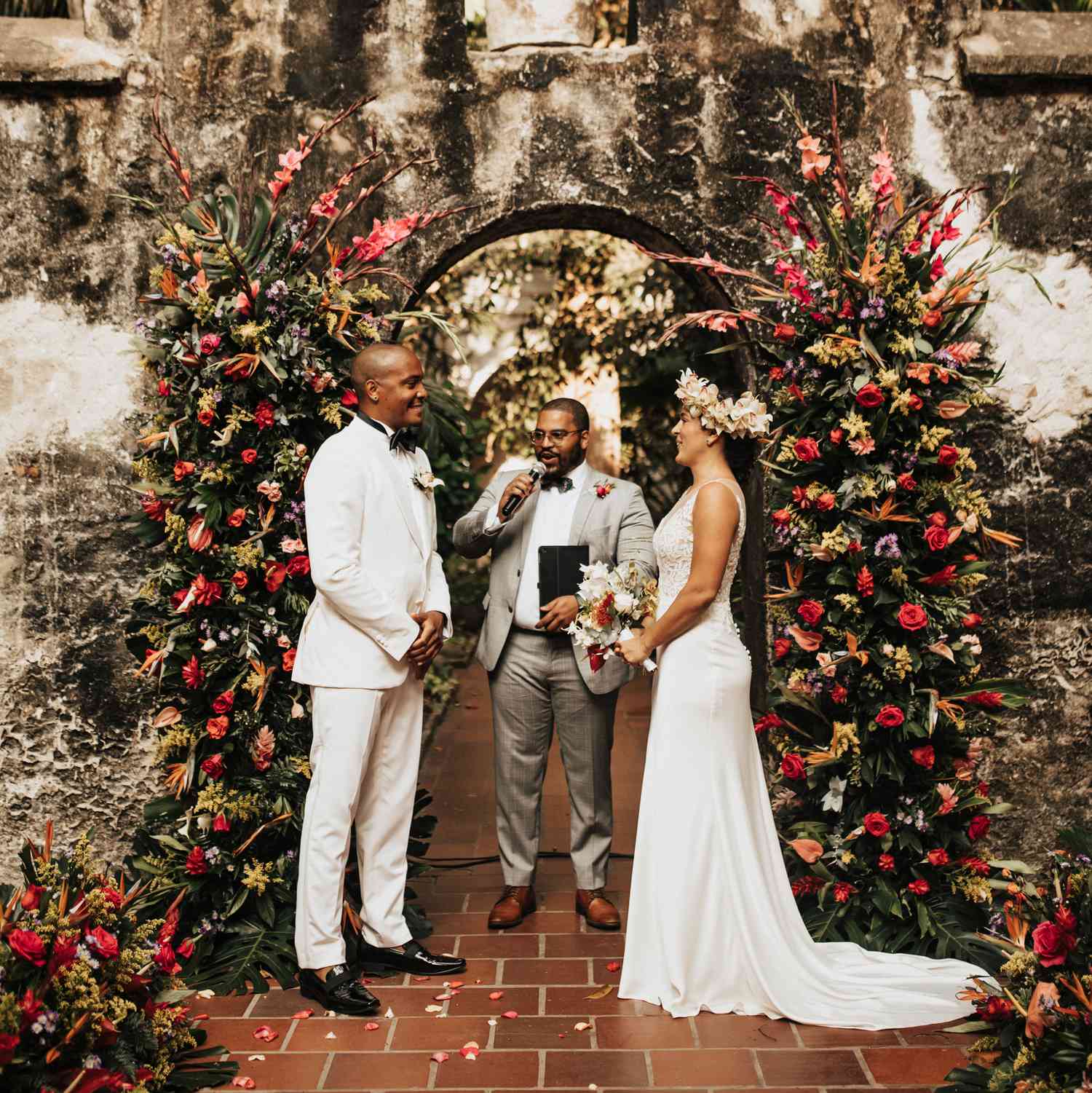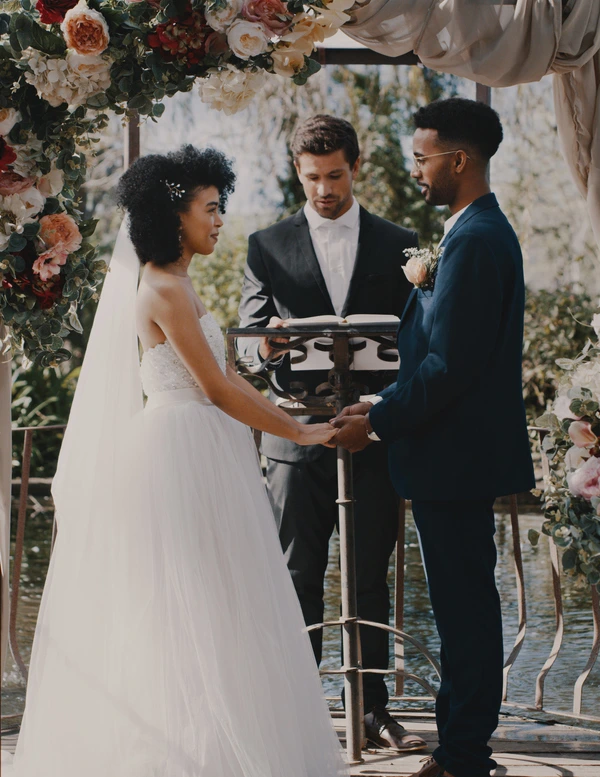Dreaming of standing before a happy couple on their big day, guiding them through the most important moment of their lives? Whether you’re a close friend, a family member, or someone looking to start a rewarding new career, learning how to become a wedding officiant is easier and more meaningful than you might think.
Becoming a wedding officiant is a growing trend in the world of weddings. With marriage equality and the rise of non-denominational ceremonies, more people than ever are seeking to officiate weddings, from intimate gatherings to grand celebrations. This guide is your complete resource for understanding the legal, ceremonial, and practical aspects of becoming an officiant, whether you want to perform marriage ceremonies for friends or build a professional brand.
This guide is perfect for aspiring officiants, engaged couples, event planners, and anyone interested in the legal and ceremonial aspects of officiating weddings.

A wedding officiant is the person legally authorized to perform a marriage ceremony and sign the marriage license. Their role goes beyond simply reciting vows—they ensure the ceremony is meaningful, memorable, and, most importantly, legally recognized. Officiants can be clergy members, ordained ministers, retired judges, or even a family member or friend who has received an official ordination certificate.
Responsibilities include:
You might be surprised to learn that in most states, anyone can become a wedding officiant! Here’s what you need to know about wedding officiant requirements:

Learning how to get ordained to officiate weddings is often as simple as completing a short online application. These are the key steps to becoming a wedding officiant, from choosing your ordination service to verifying your credentials.
Research different ordination options to find one that aligns with your beliefs and meets your state’s requirements. Popular choices include all faith ministry and various other online ministries.
Most organizations offer simple online applications that ask for basic personal information. You’ll typically provide your name and address and sometimes answer a few questions about your intentions. The process usually takes less than 10 minutes.
After submitting your application, you’ll receive confirmation of your ordination, often immediately. With all faith ministry, your official ordination certificate and ministry credentials are available digitally and may also arrive by mail within a few weeks, though many organizations also provide digital copies you can use right away.
Keep records of your ordination and any additional documentation your state requires. Some jurisdictions ask officiants to present proof of their credentials before performing ceremonies.
The entire process typically costs nothing if you choose free ordination options, though some organizations charge modest fees for expedited processing or premium credential packages.
Most people complete their ordination within 24-48 hours of starting the process. Online ordinations from reputable organizations are legitimate and legally recognized in most states. However, a few states have specific requirements or restrictions, so always check your local laws before proceeding.
The requirements to become a wedding officiant and perform marriage ceremonies can vary widely by state and even by city. While most states accept online ordination, some have additional registration requirements or restrictions. The key is researching requirements for your specific location well before the wedding date.
California presents unique considerations for wedding officiants. The state generally accepts online ordination, but officiants must be able to provide proof of their credentials if questioned. California doesn’t require officiant registration with the state, but some counties may have specific requirements. Always check with the local county clerk where you’ll be officiating to ensure compliance.
Texas requires officiants to be “regularly ordained ministers” of religious organizations. Online ordination through established organizations is typically accepted, but you may need to demonstrate ongoing affiliation with your ordaining organization.
New York accepts online ordination but requires officials to register with the city clerk’s office in New York City or with the appropriate local government office elsewhere in the state. The registration process involves presenting your ordination credentials and paying a small fee.
Florida generally accepts online ordination from recognized organizations. The state doesn’t require separate officiant registration, but you must be able to prove your ordination status if requested.
For detailed, up-to-date information, check out our state-by-state requirements page.

After the wedding ceremony, the marriage license must be properly filed to make the marriage official.
Officiant registration requirements vary significantly across different states and local jurisdictions. While many states accept online ordination without additional registration, others require officiants to register with local government offices before performing ceremonies. States requiring registration typically ask officiants to present their ordination credentials, complete an application, and sometimes pay a small fee. This process establishes you as a legally recognized officiant in that jurisdiction and may provide you with additional documentation to present if questioned about your authority.
To determine whether you need to register, contact the government office where the marriage license will be filed. They can provide current information about local requirements and guide you through any necessary registration process. Keep copies of all registration documents along with your original ordination certificate. Having complete documentation readily available demonstrates your legal authority to perform marriage ceremonies and helps ensure the smooth processing of marriage licenses.
Officiating a wedding goes beyond reading a script—it’s about guiding the couple through one of the most meaningful moments of their lives.
Before performing a marriage, it’s important to understand the legal requirements for wedding officiants in your area.
Here’s how to do it right:
Discuss their vision, tone, and any special traditions or readings they want included.
Write or customize the ceremony structure: welcome, readings, vows, ring exchange, pronouncement, and closing.
Rehearse the script to ensure smooth delivery. Join the couple at the rehearsal if possible.
Bring your script, ordination credentials, and the marriage license. Dress appropriately for the occasion.
Speak clearly, pause for emotional moments, and guide the couple and guests with calm authority.
Complete and submit the license as required by the local jurisdiction to make the marriage legal.

To improve your skills, consider enrolling in wedding officiant training and courses that focus on public speaking, ceremony writing, and legal best practices. If you loved the experience and want to perform marriage ceremonies professionally, here’s how to build your brand and attract more couples:
No, you don’t need to be religious to officiate weddings. Many non-denominational organizations and secular ministries like all faith ministry offer ordination to people regardless of their religious beliefs. What matters most is your commitment to helping couples celebrate their marriage legally and meaningfully.
Yes, family members can absolutely officiate weddings in most states, provided they obtain proper ordination and meet local requirements. Many couples choose close friends or relatives to perform their ceremony, creating a more personal and intimate experience.
Don’t worry—minor mistakes during wedding ceremonies are common and rarely cause legal issues. The most important elements are ensuring the couple exchanges vows, you pronounce them married, and all paperwork is completed correctly. Most guests and couples understand that officiants are human and may stumble over words occasionally.
This depends on each state’s specific requirements. Some states have reciprocity agreements that recognize officiants ordained in other states, while others require separate registration or ordination. If you plan to officiate in multiple states, research requirements for each jurisdiction well in advance.
Always bring your wedding officiant certification and any required registration documents. Some states or venues may request to see proof of your authority to perform marriages. It’s also wise to bring a backup copy of the ceremony script and any special instructions from the couple.
Becoming a wedding officiant is a rewarding journey that’s more accessible than ever. By following this step-by-step guide, you can easily get ordained, meet all legal requirements, and create a memorable wedding ceremony for any couple. Whether you want to officiate a wedding for a loved one or launch a professional career, the process is straightforward, meaningful, and completely legal. Ready to take the first step? Get ordained today with the all faith ministry and start making wedding dreams come true.
all faith ministry – We Ordain
Copyright © 2024. All rights reserved.